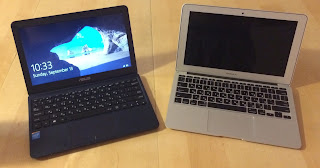My little daughter is 9, and we've decided it's time to get her a laptop.
I was looking for something that has a small form factor, no moving parts, and inexpensive.
Was considering a
Chromebook, but then came across the
x205ta from Asus - A small, Chromebook-like device, capable of running Windows 10.
Price was under 200$, so not much of a risk, and after receiving the machine with windows 8.1, I had to upgrade to windows 10 (Left the upgrade working overnight.)
After using it a little bit, the obvious question was - How does it work in comparison with my (Now wife's)
Macbook Air 11?
So here are some conclusions:
- Specs: The Asus has budget processor, 32 GB drive, 2 GB ram and costs 25%. Though these specs are quite nothing in comparison with the Air's Haswell processor and 4/128 RAM, But you can get a 128GB micro SD and extend your HD capacity for dirt cheap.
- Form factor: The tiny Asus is a bit lighter, smaller width, and thicker than the Air 11.
- Finish: No comparison here. The Asus feels much cheaper. Its keyboard and touchpad are ok. The screen has the same resolution, but isn't as good. But it's completely ok, considering it costs quarter than the Mac.
- Performance: Well, you can't really compare a budget processor and 2 GB RAM to a top of the line one with 4 GB. But Windows 10 actually works really well, runs office and browsing fine, and (Compared to the unusable Metro UI) is very comfortable to use. It's not a gaming platform.
- Battery life: Now this is the first time I've seen a windows laptop runs so long between charges. More than 12 hours (For browsing and office usage). The Air? 9 hours was my record.
- Software: The most important software for my kid is office, and though Office runs on both laptops, Hebrew support for Office still lags on Mac OS. The Asus comes with 1 year free Office subscription.
In conclusion - This is a very smart buy for students. Cheap, light, fun to use, and runs everything you need - It's not a tool for heavy programming, photoshopping or gaming, but rather for browsing and office applications. The price is the main disruption here - Why get a tablet for your kid when you can get her a fully functional laptop?
This is quite like comparing apples and peaches (Pun intended) - Eventually, if I'm a casual user, this is a no brainer - The Asus takes it. But if I'm a heavy user and need an ultraportable, the x205ta isn't an alternative to the Air. I would look for something more in the area of the Air's 800-900$ MSRP (Yes, they MSRP for less now...).


